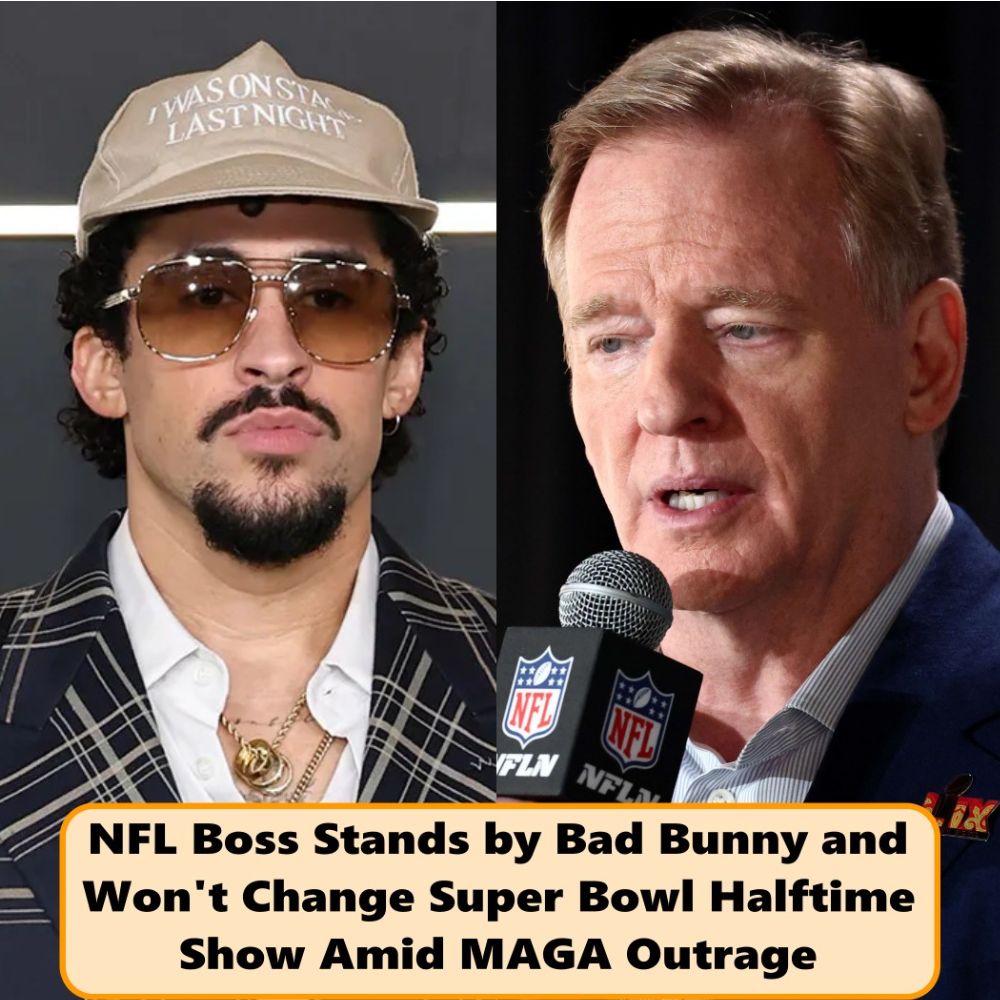NFL Chief Defies MAGA Backlash, Refuses to Drop Bad Bunny: Promises Halftime Show Will Be a “Moment of Unity”

NFL Commissioner Roger Goodell is defending the league’s decision to tap Bad Bunny as the 2026 Super Bowl Halftime Show headliner, despite ongoing criticism from conservative figures who object to the Puerto Rican superstar’s predominantly Spanish-language catalog. Announced by Apple Music and the NFL on Sept. 28, the booking sparked a wave of outrage from MAGA-aligned personalities and politicians—but Goodell says the league is unwavering.
“It’s carefully thought through,” Goodell said, via the Associated Press. “I’m not sure we’ve ever selected an artist where we didn’t have some blowback or criticism. It’s pretty hard to do when you have literally hundreds of millions of people that are watching… We’re confident it’s going to be a great show. He understands the platform that he’s on, and I think it’s going to be exciting and a united moment.”
Goodell added that Bad Bunny fits the NFL’s entertainment mandate. “He’s one of the leading and most popular entertainers in the world. That’s what we try to achieve. It’s an important stage for us. It’s an important element to the entertainment value.”
The Backlash: Language, Politics, and Culture Wars
The selection immediately drew fire from several conservative voices, including former President Donald Trump, who dismissed the choice as “absolutely ridiculous” during a NewsMax interview—while admitting he hadn’t heard of the artist. “I don’t know who he is… I don’t know why they’re doing it. It’s crazy,” Trump said, suggesting the blame lay with outside promoters.
Corey Lewandowski, Trump’s former campaign manager, escalated rhetoric further, threatening that ICE agents would be present at the Super Bowl next year and vowing aggressive enforcement against undocumented attendees. His statements were later echoed by Department of Homeland Security figure Kristi Noem, who told conservative host Benny Johnson that ICE would be “all over that place” and intended to “enforce the law” at the event.
The criticism has also manifested culturally, with reports of a viral petition calling for the NFL to replace Bad Bunny with country legend George Strait. Right-wing youth organization Turning Point USA announced plans to stage its own “protest” halftime show during the game.
Bad Bunny’s 2026 Plans and Concerns About Touring in the U.S.
The announcement is notable in Bad Bunny’s touring schedule: his Debí Tirar Más Fotos World Tour is slated to run from December through July 2026 with no U.S. stops. He told I-D magazine last month that concerns about ICE raids contributed to his decision to avoid the United States on this run, making the Super Bowl his lone U.S. performance that year.
Support from the Music Community
Bad Bunny’s selection has drawn strong support from artists across genres. Shakira, who co-headlined the Super Bowl Halftime Show with Jennifer Lopez and featured Bad Bunny during her performance, praised the decision. “I’m so proud that Bad Bunny, who represents not only Latin culture but also how important Spanish language music has become on a global scale and how universal it has become, is getting to perform on the biggest stage in the world,” she told Variety. “It’s the perfect moment for a performance like this. I can’t wait to watch it.”
The NFL’s Calculus: Global Reach and Cultural Resonance
Goodell’s stance underscores the NFL’s broader strategy to reflect the global reach of contemporary music and the league’s diverse fanbase. Super Bowl halftime bookings—from Beyoncé and Rihanna to Shakira and J Balvin—have often sparked debates, but they also tend to deliver massive viewership and cultural impact.
By sticking with Bad Bunny, the NFL is signaling that international appeal and cultural representation outweigh political pressure. The league appears confident that the artist’s stagecraft and crossover power will resonate with a vast audience, and Goodell’s emphasis on a “united moment” suggests an effort to elevate the halftime show beyond the nation’s cultural fault lines.
What Comes Next
With months to go before the 2026 Super Bowl, the political noise around Bad Bunny’s performance will likely continue. Yet the NFL’s message is clear: the halftime show is a global platform intended to entertain and reflect the breadth of modern music. If history is any guide, controversy may drive curiosity—and viewership—while the performance itself becomes a defining moment of the broadcast.
For Bad Bunny, it’s a singular U.S. appearance framed by intense scrutiny and vocal support alike. For the NFL, it’s a bet that cultural relevance and superstar power can cut through the outrage and deliver exactly what Goodell promised: a high-energy spectacle that brings people together, if only for a few unforgettable minutes.